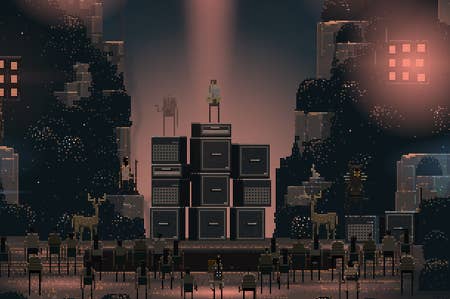GDC: Capybara says indies should chase innovation, not Rovio
Nathan Vella says aping Angry Birds is a "really bad business decision"
Nathan Vella, co-founder of Capybara Games, has warned fellow indie developers at GDC about the danger of trying to emulate the success of Rovio's Angry Birds, saying that they should be chasing innovation and creativity instead.
Trying to make a blockbuster title which has mass appeal not only limits originality, says Vella, but will also prove damaging to both reputation and finances.
"I personally believe that one of the scariest parts of the massive success of the iOS platform is that it has taught developers that they should try and make games for everyone," Vella told his audience at the San Francisco event.
"It seems like an obvious choice because games like Angry Birds, Fruit Ninja and Cut the Rope sold 10, 20 million copies but, believe it or not, I actually I think that's a really bad business decision.
"When you say 'I'm making a game for everyone' it actually means you're not really making a game for anyone."
Capybara's product slate is the perfect illustration of Vella's advice. The Toronto studio has seen both critical and commercial success with relatively niche titles like iOS indie hit Superbrothers: Swords & Sworcery and the multi-platform match-three take on the Might and Magic universe, Clash of Heroes.
Swords and Sworcery has now sold over 350,000 copies, Vella told GDC, not because it had been developed for mass appeal, but laser-targeted at a particular audience.
"Internally at Capy we talk a lot about playing the iPhone lottery - basically that's what happens when you try to compete against everyone who is trying to do the same thing."
Nathan Vella, Capybara Games
"Everyone wants to make a million-selling game, and that's cool, but the problem with the hit-based mentality is it puts you in direct competition with all the other people who have the same hit-based mentality - the people who aren't creative enough to make a unique game, and the people who aren't willing to take the risk to make something that actually has a soul, or is fresh, or flies in the face of conventional wisdom.
"Internally at Capy we talk a lot about playing the iPhone lottery - basically that's what happens when you try to compete against everyone who is trying to do the same thing.
"You're trying to make the next Angry Birds, so what you're doing is basically walking up to a slot machine, putting the budget of your game into the slot, pulling the lever and praying to God that you get three f****** cherries. In reality, one in 10,000 maybe do okay - I don't know the odds."
Making your mark in a marketplace which has seen over 25 billion downloads needs individuality, charm and an understanding of your audience - qualities which Vella says can't come with a scattergun approach.
"It's very important that your game stands out. Digital platforms are a f****** sea of games and basically every day that sea's tide rises and there's 10,000 more.
"Different and risky games in reality are a very rare thing. On iOS, maybe one or two per cent fall into that risky category. So when standing out is so critical, is making something risky, really that risky? Or is it actually more risky to make something that doesn't stand out?
"There's a subset of gamers who want to play something new. If you provide them with something worth playing you're not actually competing against 99 per cent of the market. You're competing with the one per cent. Sure, you might not reach the biggest slice of the money pie but you're ensuring your project has a really good chance of being successful."

